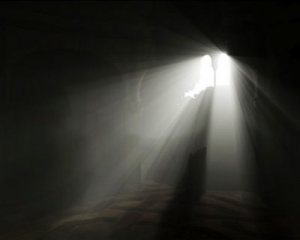In today’s first reading, we see how central the Gospel is to the apostles’ life. Immediately upon being released from prison, they go right back to work. They don’t run home and get a shower. There is no time to grab a bite to eat. They went to the temple and began to teach. They did what the angel told them to do, even if it meant being arrested again and thrown back into prison.
Then in the Gospel, we see Jesus talking to Nicodemus. The first part we hear is probably the most familiar verse to Christians around the world. “For God so loved the world that he gave his only-begotten Son so that everyone who believes in him might not perish but might have eternal life.” We see this on billboards and fliers, held up at sporting events, and so on.
The part that should catch our attention, though, is when Jesus says, “this is the verdict.” In a courtroom when a judge looks to the jury and asks “what is the verdict.” Everyone hangs on the words of the foreman as he delivers it. This is the verdict: even though God gave His only Son, even though God offered salvation and freedom from sin, even though God offered to open the doors of the prison and set us free, “people preferred darkness to light.” That should make us look at our lives, at what kind of verdict we are going to receive.
We must examine not just what we believe intellectually but how we live it out. There is a Latin phrase I’ve spoken about before—roughly the law of living, the law of faith, and the law of prayer. How we act, how we pray, and what we believe all inform and influence one another. If I claim that God is central to my life, but I live as if He is last, then my belief will slowly start to dwindle in that fact.
In this pandemic, we’ve our faith challenged. The attendance of Mass, and thank you for being here today, is still dwindling. Our faith tells us that Jesus is here, waiting for us, offering light, but so often, many of us choose darkness instead. We live as if Jesus is the last thing we need when the Sacraments are the cornerstone of our salvation. “Whoever lives the truth comes to the light.” Lex Vivendi. The law of living. Jesus is the light. Every time we choose something contrary to his commands, every time we show up at an event that celebrates something less than holiness, every time words come out of our mouth, or we laugh at a risqué joke, we allow a little bit of the light we have to dim.
It’s hard to notice when lights dim. Over time, as bulbs age, rooms darken. Putting in new light bulbs can show us how dust and grime have built up, and we haven’t even noticed. When we begin in darkness at the Easter vigil, the Church in its liturgy reminds us just how much the light makes a difference. It bursts into the room, illuminating everything, making it all clear. “Whoever lives the truth comes to the light.” In the Confessional, God frees us from the shackles of sin, and He says to us: “Go […] tell people everything about this life.” Remind any of our brothers and sisters to come back to Mass, encourage the family to return, to come back to Jesus in Confession and the Eucharist, and we must begin to live our own lives in a way that shows we believe just how important the Light is to us.
It is Easter! Rejoice and be glad, for God has come to save the world, not condemn it. But we are not saved to be silent! So go forth, “tell people everything about this life!”
A homily for Wednesday of the Second Week of Easter: 4/14/2021

